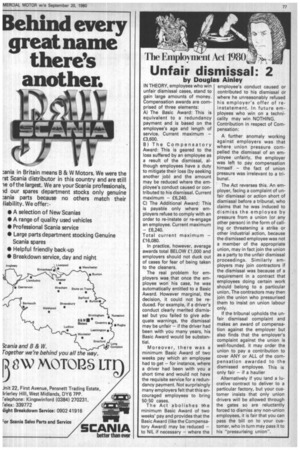The Employment Act 1980
Page 81

If you've noticed an error in this article please click here to report it so we can fix it.
Unfair dismissal: 2
by Douglas Ain ley
IN THEORY, employees who win unfair dismissal cases, stand to gain large amounts of money. Compensation awards are comprised of three elements: A) The Basic Award: This is equivalent to a redundancy payment and is based on the employee's age and length of service. Current maximum — £3,600.
B) The Compensatory Award: This is geared to the loss suffered by an employee as a result of the dismissal, although employees have a duty to mitigate their loss (by seeking another job) and the amount may be reduced where the employee's conduct caused or contributed to his dismissal. Current maximum — £6,240.
C) The Additional Award: This is payable only where employers refuse to comply with an order to re-instate or re-engage an employee. Current maximum — £6,240.
Total current maximum — £16,080.
In practice, however, average awards total BELOW £1,000 and employers should not duck out of cases for fear of being taken to the cleaners.
The real problem for employers was that once the employee won his case, he was automatically entitled to a Basic Award. However marginal, the decision, it could not be reduced. For example, if a driver's conduct clearly merited dismissal but you failed to give adequate warnings, the dismissal may be unfair — if the driver had been with you many years, his Basic Award would be substantial.
Moreover, there was a minimum Basic Award of two weeks pay which an employee had to get — for instance, where a driver had been with you a short time and would not have the requisite service for a redundancy payment. Not surprisingly many employers felt that this encouraged employees to bring 50:50 cases.
The Act abolishes the minimum Basic Award of two weeks' pay and provides that the Basic Award (like the Compensatory Award) may be reduced — to NIL if necessary — where the employee's conduct caused or contributed to his dismissal or where he unreasonably refused his employer's offer of reinstatement. In future employees who win on a technicality may win NOTHING. Contribution in respect of Compensation: A further anomaly working against employers was that where union pressure compelled the dismissal of an employee unfairly, the employer was left to pay compensation himself — the fact of union pressure was irrelevant to a tribunal.
The Act reverses this. An employer, facing a complaint of unfair dismissal or action short of dismissal before a tribunal, who claims that he was induced to dismiss the employee by pressure from a union (or any other person) in the form of calling or threatening a strike or other industrial action, because the dismissed employee was not a member of the appropriate union, may in fact join the union as a party to the unfair dismissal proceedings. Similarly employers may join contractors if the dismissal was because of a requirement in a contract that employees doing certain work should belong to a particular union. The contractors may then join the union who pressurised them to insist on union labour only.
If the tribunal upholds the unfair dismissal complaint and makes an award of compensation against the employer but also finds that the employer's complaint against the union is well-founded, it may order the union to pay a contribution to cover ANY or ALL of the compensation awarded to the dismissed employee. This is only fair — if a haulier Alternatively if you land a lucrative contract to deliver to a particular factory, but your customer insists that only union drivers will be allowed through the gates so are reluctantly forced to dismiss any non-union employees, it is fair that you can pass the bill on to your customer, who in turn may pass it to his "pressurising union".






























































































































